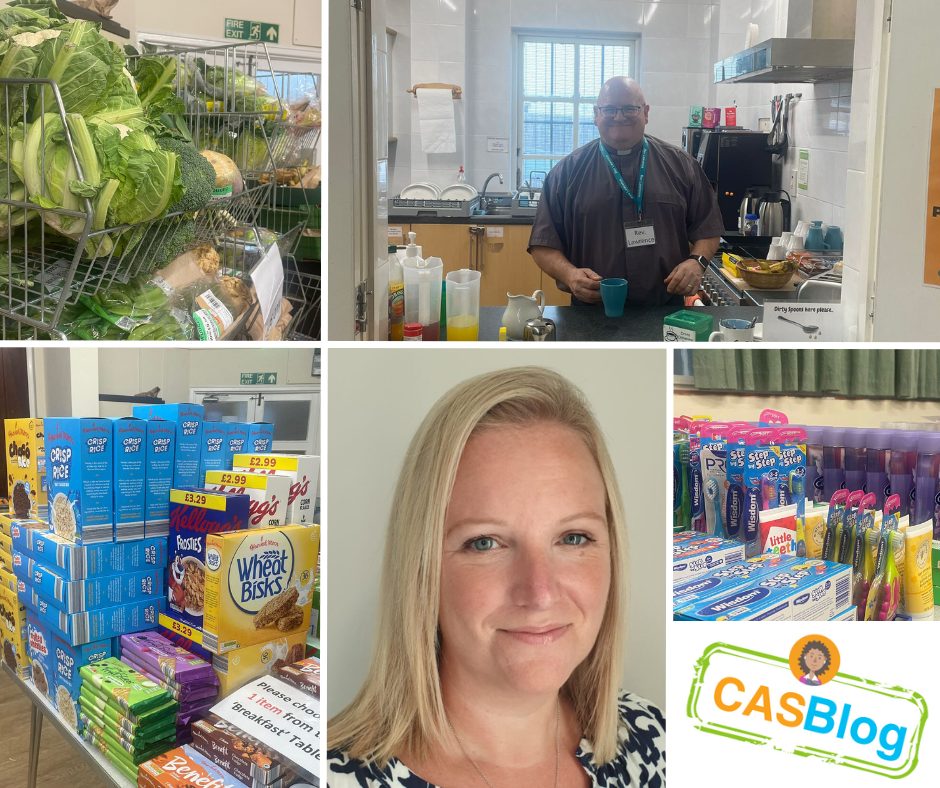
I recently had the pleasure of visiting the Triangle Top Up Shop in Ipswich one of the 11 Ipswich Top Up Shops and, I have to say, rarely are Wednesday mornings quite so inspirational. Where I would usually head straight to my laptop, coffee in hand ready to wade through the inbox; this morning I met Rev Lawrence, and Rev Kiran and some of the dedicated volunteers that show up week in, week out, to support their local community. With 53 customers queuing at the door for the shop to open and more than 100 people coming through within the first hour, the whole place was a buzz of activity. With the community café in one room focused on Wellbeing Wednesday, the food and other items which form the shop in another, and a smaller meeting room at the back of the premises which we shared with 4 slow cookers emitting an incredible bouquet of Asian cooking, this is so much more than a provider of food to those who need it. The positive impact of this provision on physical and mental health, wellbeing, and reducing social isolation is clear and yet the passionate people who run and volunteer at the shop continue to face daily challenges just to keep the provision going – all while trying to make sure every customer has the time and space they require from the support on offer.
The growth of food provision in our county has risen dramatically over the last few months/years to try and meet the also ever-increasing need of those facing food poverty. We’ve recently mapped 200+ food projects in Suffolk and discover more every week. Ranging from foodbanks and pantries, to top up shops, unmanned community cupboards and fridges, and growing projects – the diversity of the food network clearly demonstrates the differences in need and accessibility required to support Suffolk’s communities, and the social value (and return on investment) of these types of provision should not be forgotten. For those primarily in the pantry/top up space, it is often about providing other services and opportunities in addition to food – it could be healthy recipes, cooking classes, budgeting, health checks, slow cooker kits, debt advice, and/or a friendly ear in the community café. All of these have been and/or are, available at the Triangle Top Up Shop who often work in partnership with other agencies to come and provide professional advice and guidance. And let’s be clear – this not only helps other agencies carry out more activity but because all these residents are in one place where they feel safe and trust those around them, this also represents a cost saving for those other agencies tasked with outreach.
Overwhelmingly, every question myself and other visitors asked, and subsequent conversations had this morning, came back to one overriding focus – COMMUNITY. Whether about being a faith-based shop that welcomes everyone regardless of religion or belief, about the outcomes and impacts for those that access the shop, about removing barriers for those that don’t want to or feel they can’t take the first step across the shop threshold, or about being part of a wider mini-network which includes 10 other top up shops in the Ipswich area; the sense of belonging and being part of a community is key. And when I asked the difficult question about what the future looks like and whether it is possible to remove the need for the provision, the answer was that regardless of whether there was a need for food, there will always be a need for community.
While the aspiration should always be that Suffolk’s residents have equity of food accessibility – the need for provision such as this with a primary purpose of food distribution, is unlikely to ever go away completely. There is much work for us all to do to support individuals, but it is also about how as a system, we reduce reliance and increase sustainability of the food outlets offering that wraparound advice and guidance. It is about how we support projects such as the Ipswich Top Up Shops to face the challenges and make that difference in their communities, listening to their experience and learning from it, working with the stories and the data they provide to seek out ways to help, and using all that alongside information from other parts of the Voluntary Sector to inform policy, strategy and most importantly, action, wherever we can.
Local food projects of all different shapes and sizes need our help in lots of different ways, so here’s a few examples of how you could get involved –
Are you an employer looking for ESV options?
Are you a business with spare storage room that local food outlets could access?
Are you a supermarket or shop of any description that would like to donate food/non-food items?
Does your profession mean you could help community food projects overcome barriers to bulk buying food and non-food items?
Do you want to volunteer at a community food outlet?
Or lastly, do you want to donate financially or otherwise to community food provision in your area?
If so, I’d love to hear from you: